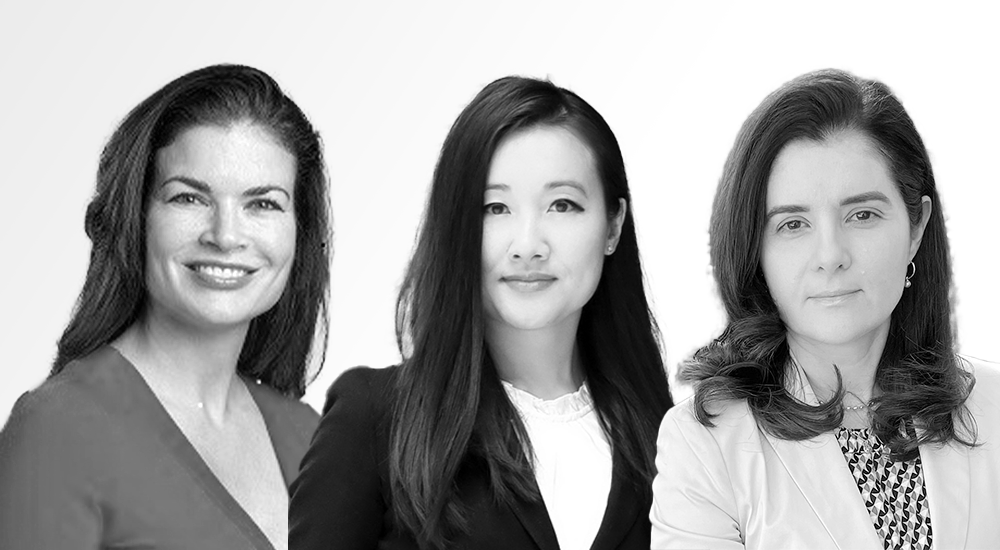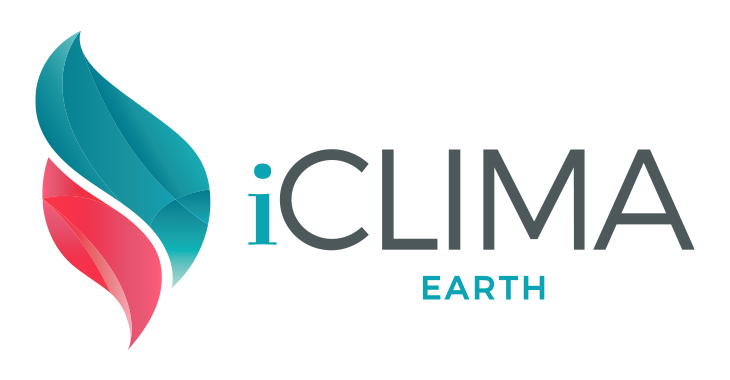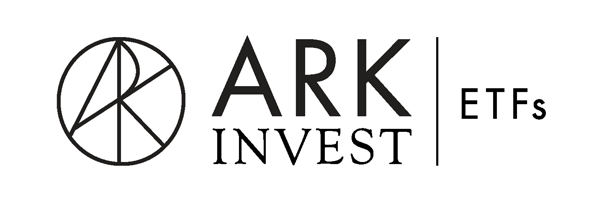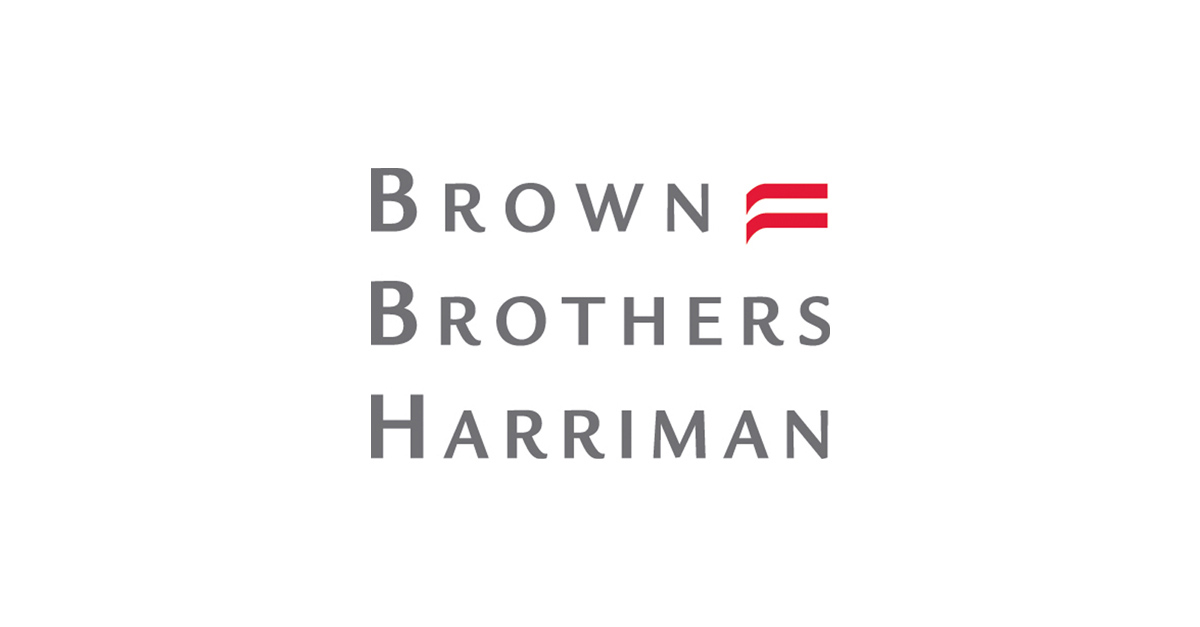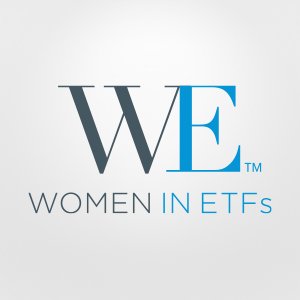As the non-profit Women in ETFs rings the bell for gender equality at stock exchanges across the world, it is a fitting time to reflect on just a few of the individuals delivering a positive impact through innovation and advocacy within ETFs.
Perth Tolle, founder of Life + Liberty Indexes
Tolle (pictured middle) started her own indexing business in 2017 to offer a new way of playing emerging markets, based on the idea that weighting towards ‘freer’ countries would provide long-term alpha and reward political best-practice.
Having grown up in China and the US, Tolle first became aware of the difference freedom makes in markets when returning to Hong Kong after college in 2003.
“One thing that gave me my convictions on freedom was watching the one-child policy,” she said. “I had a friend in Shanghai who was around the same age as me and she had no birth certificate, no school records. She does not exist on paper because she was the second-born child and her parents chose to register her brother for existence.
“She was one of the lucky ones. There are 30 million missing women in China due to the one-child policy in my generation.”
The country now operates a three-child policy to combat its growing, ageing population. Swathing policies such as these have far-reaching effects on society and markets, Tolle said, with no guarantee of a positive outcome despite no short measure of human suffering along the way.
Tolle then spent 10 years as an adviser at Fidelity where some of her clients expressed opposition to investing in “autocracies” such as Russia, Saudi Arabia and China.
Achieving exclusions on these kinds of exposures through emerging markets indices remains difficult, with the MSCI World Emerging Markets index allocating more than 35% to these three countries alone, down from more than 50% last year.
However, Tolle’s Freedom 100 Emerging Markets index currently excludes securities from China, Russia, Saudi Arabia, Turkey, Egypt, the United Arab Emirates, Qatar and others, based on their low scores on 79 metrics on personal, political and economic freedoms provided by independent think-tanks.
Tolle said she expects to deliver long-term outperformance given freer countries can grow sustainably, recover faster from drawdowns and use their capital labour more efficiently so there is less capital flight and capital destruction. Supporting this, she pointed to the ongoing capital flight from Russia and capital destruction last year in China because of the "intrusion on private market activities to reverse the policies that made them prosperous over time”.
Looking at the industry, she argued ESG products ought to pay more attention to the strength of institutions, the application of rule of law and investor protections, which she described as “akin to a quality factor at the country level”.
She added such considerations need to apply to women’s freedoms, especially in emerging markets. Currently, her index includes metrics covering women’s right to movement, women’s right to children after a divorce, women’s right to inheritance and then an examination of missing women and then female genital mutilation (FGM).
She concluded: “These are issues that are often forgotten when looking at freedom and ESG through a developed markets lens. It is not about women on boards or equal pay, it is about ‘do you get killed for being a girl and going to school?’, ‘do you get killed for even being a girl before you are even born?’. These are the kinds of issues the finance world is largely blind to because we in the developed world have the privilege of freedom.”
Gabriela Herculano, CEO and co-founder of iClima Earth
Herculano (pictured right) came from a background in private equity – and almost two decades underwriting long-term infrastructure investments – to co-found iClima Earth in 2019, offering investors a simple way of capturing the full array of carbon reduction solutions through a single investment.
“Co-founder Shaila Khan Leekha and I started this business almost three years ago because it was so hard to invest beyond renewable energy and we felt there was a big problem. It is going to take so much more to mitigate climate change beyond renewable energy and it was incredibly difficult to have a vehicle that could tell that story of these relevant solutions.
“That sense of urgency motivated us to find how impactful certain solutions could be and ways of scaling them up.”
From this base, Herculano and her team built the iClima Global Decarbonisation Enablers index “from scratch”.
Beyond just grid-scale renewable utilities, the index funnels capital into providers of heat pumps, smart metres, smart thermostats, inverters, waste management, solar panels, electric vehicles (EV), micro transportation, solar rooftops, fuel cells, electrolysers, long-duration energy storage, telepresence, plant-based diets and more.
Speaking on her firm’s decarbonisation enablers, degenerated energy and green hydrogen benchmarks, Herculano said: “We think in a material way these put us on track. We need to do what we can to help the invisible hand work its way out and go to the investments that really make a difference.”
iClima’s indices are now tracked by ETFs in Europe and the US, offering investors across different continents the chance to capture a fuller view of the decarbonisation story.
Speaking on some of the biggest names in the industry, Herculano said she admires Cathie Wood, founder, CEO and CIO of ARK Invest, and credits her stardom in the investment world to her strong resolve.
“She is very confident and has had an extremely successful career, so she can stand by her convictions – but because she is a woman, she is potentially used to being challenged and having to stick to her guns,” Herculano said.
“She went and did her own thing, which takes strong belief, even as people were pushing back and saying no.”
Elsewhere, Herculano praised the growing number of women in C-suite positions in typically male-dominated STEM sectors, including clean tech start-ups and listed companies.
Andrea Murray, head of business development at Blackwater Search & Advisory
Murray (pictured left) has spent 24 years in financial services in roles spanning relationship management and sales across Brown Brothers Harriman, ProShares, Chancellor Hattersley Lloyd and most recently, Blackwater Search & Advisory.
At Blackwater, she authors a variety of ETF educational content including research and video interviews, with an effort to equally spotlight ETF thought leaders of different genders.
“My goal is to provide opportunities not only to a diverse audience but also new faces who may not have been given the opportunity by their own leadership,” Murray said.
Outside of the office, she is the co-head of the London chapter of Women in ETFs, an organisation focused on developing and sponsoring talent, recognising the achievements of women in the industry and investing in the ETF community.
While celebrating the progress made within financial services regarding improved diversity and more equal opportunity, Murray said “there is still plenty of room for change, most critically at the top”.
She highlighted the recent Women in the Boardroom study from Deloitte and The 30% Club, which showed women hold less than 20% of board seats globally. Among this, the top five performing countries were in Europe while the US lagged behind, a fact Murray partially attributed to its slow uptake of ESG and the impact this has had on executive management diversity elsewhere.
Advocating for a more top-down approach, Murray concluded: “There should be dedicated teams within organisations that truly show through actions by setting a higher target to promote more females to executive level positions.
“That is much more critical than just simply seeing diversity as a set of numeric goals that need to be achieved across an organisation.”
Related articles
